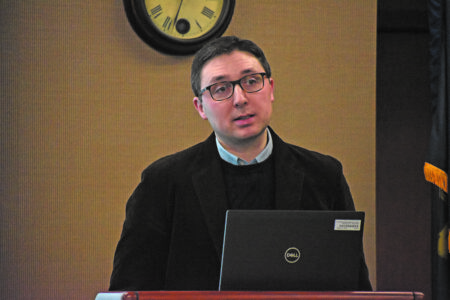Higher education drives Upper Peninsula’s economic and cultural ecosystem
Eight colleges bring nearly $1 billion a year to U.P.

Tucked away among the miles of forestland and quaint communities of Michigan’s U.P. are four universities and four community colleges that have become
powerful drivers of economic growth, incubators of groundbreaking research, and builders of a skilled workforce.
The region’s higher education institutions collectively employ more than 3,800 faculty and staff and attract more than 20,800 students to the U.P. each year. Their combined impact on the economy is impressive. According to a report from Anderson Economic Group, Michigan Technological University’s (MTU) economic impact on the state is as high as $450 million. Gogebic Community College (GCC) touts local returns of around $5.30 for every dollar received. In towns like Sault Ste. Marie, where Lake Superior State University (LSSU) employs one in 10 county residents, universities are the largest employers.
Beyond the myriad of opportunities for hands-on education for LSSU’s student body, each student brings an estimated $45,000 worth of economic activity to the region for a total economic impact of $113 million per year. Investments and expenditures from Northern Michigan University (NMU) — in addition to spending from its students and campus visitors — contribute over $200 million to the U.P. annually.
MTU and NMU, the U.P.’s two largest universities, also have robust research facilities and strong, mutually beneficial partnerships with local employers and industries. For example, commercial lenders like Northern Initiatives, business incubators like Innovate Marquette SmartZone / Invent@NMU, and entrepreneurial services like MTEC Smartzone offer community members, small business owners, and grads tools for economic success and job creation. LSSU partners with municipalities and government programs, acting as a job funnel that fills high-demand roles in essential programs.
Smaller institutions like Gogebic Community College, Finlandia University, Bay De Noc Community College, Bay Mills Community College, and Keweenaw Bay Ojibwe Community College offer affordable, culturally relevant educational programs. Over 61% of graduates from the U.P.’s smaller institutions stay within the county or neighboring counties after graduation and gain direct employment in the region. With the vast majority staying in the area, college educated employees add immeasurable economic prosperity to the state decades after graduation and eliminate brain drain from rural U.P. communities. On average, 30-40% of MTU, LSSU, and NMU graduates find gainful careers within 50 miles of campus.
Figures from Bay De Noc highlight the benefits of all the U.P. community colleges. Bay students contribute $9.2 million of taxable income to the Michigan economy. Because of their education, associate degree graduates at Bay will earn $300,000 more throughout their career than someone with a high school diploma. For every dollar of state or local tax money invested in Bay, $2.2 returns to the community.
“Unlike in bigger cities, universities tend to have a significant influence on our communities here in the U.P.,” says Eric Waara, City Manager of Houghton, which is home to MTU. “For example, Loyola is only a small part of Chicago’s economy. Comparably, our communities are smaller, so universities and colleges drive the economy, ecosystem, culture, and energy in a much more significant way.”
The U.P.’s academic sector creates family-sustaining job opportunities and incentives for people to relocate to the region. New residents purchase homes, contributing to property taxes that increase city revenues. Along with students and visiting families — especially those who travel from overseas — they spend money in restaurants, hotels, and retails outlets, keeping local businesses thriving. These institutions also play a significant role in shaping the area’s vibrant culture. With its unique mix of high-tech innovation and apple-pie downtowns, the U.P. is a magnet for intelligent, interesting people who appreciate the beautiful surroundings and active lifestyle.
Adam Paltzer, Vice President of Operations at ABLE Medical Devices in Marquette, says because of NMU, ABLE can thrive. “NMU acts as a job pipeline,” said Paltzer. “Students from the Engineering Technology Department are already well versed in state-of-the-art technology before they’re hired. Jobs in our field are expected to grow and we can provide great employees good salaries.”
“The U.P.’s universities feed area commercial entities like ABLE in many ways. When companies support higher education institutions, mutually beneficial partnerships are formed, enabling symbiotic success. Each U.P. college town is very different, but all have community-centered vibes that reflect the exceptional relationship between local business, industry, and higher education. These investments have clear, direct and profound impacts on the region.”
The economic benefits of higher education extend to individuals as well. “Education, like the kind our students get at Michigan Tech, breaks the cycle of poverty,” notes Dr. John Lehman, Vice President for University Relations and Enrollment at MTU. “This is the American dream.”
Dr. Lehman explains that about a quarter of MTU’s students come from depressed economic conditions that put them in the bottom 20% of family income earners in the nation. By the time they graduate from college, they have moved up to the 50th percentile — from poverty to the middle class. By mid-career, they are in the top 20% of income earners.
As employers, business incubators, business partners, and cultural influencers, the Upper Peninsula’s universities make vital contributions to their local economies. From job creation to fueling knowledge and sparking innovation, they increase the living standards for the entire region and its people.






